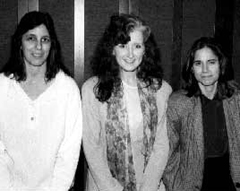Commencement 1992
Bonnie Raitt Delivers Commencement Address
I am extremely humbled at this time. I was so inspired after listening to you today, Joe [referring to the Commencement remarks given moments earlier by Joe Smith, CEO, Capitol-EMI Music Inc.]. President Berk, I don't know what to say, I feel like I did when I was a freshman and 18—just a few minutes ago—across the river [referring to her days at Radcliffe]. To be celebrated in the town where I started to play and had my first dreams come true is really an honor. I feel so grateful today to be the recipient of this great award from this prestigious college.
Bonnie Raitt (center) is flanked by Berklee guitar professors Robin Stone (left) and Lauren Pasarelli (right).
I never thought that what I was doing was earthshattering, original, or world- class. I think by nature of persevering and lasting this long, that there is a certain amount of dignity and respect that comes with the territory. The amount of accolades that I have received lately makes me quake in my boots. But I will attempt to put into words some of the thoughts I have had in the last few days thinking about this event.
As a woman in the music business, I think a lot of doors were opened for me because I played an instrument. I get asked all the time "Was it hard for you?" In fact, I think that in business—like in the rest of the world—looks, opportunity, and who you know make more of a difference than they should. In our institutions of learning and in the music business, of which I am a part, there certainly are not enough women faces up here on the dais, up here on the student body, as there are not enough people of color. This will be changing, I hope, as the student body and faculty continue to listen to people vocalizing their hopes and their aspirations for a change in this policy, which certainly needs to be addressed. It shouldn't matter what you look like; it shouldn't matter who you know. In the last few years with the advent of people like Melissa Etheridge, Traci Chapman, Suzanne Vega, a countless number of women artists from the late '80s have brought my heart great relief. During the disco days and the nonprogressive FM radio era, I was very discouraged. On top of that, the political climate of the country lurched to the right and undid a lot of the great forward movement we had in social justice and environmental reform.
I was really heartened to see the industry and the world-at-large embrace social activism, true, honest musicianship, songwriting, and a nonsexist approach to women in the music business. I look around and see more women behind the engineering boards and in the studios—not enough yet. I'm still very dismayed when I get asked about women lead guitarists. In my 22 years in the business, I can still count the ones that have national recognition, on one hand. I don't know why that is, but I'm sure it has something to do with deep-seated habits and the ways of doing business-as-usual.
I'd really like to say today that my incredible career resurgence in the last few years is a testament that if you stick to your integrity and your goals, eventually somebody will appreciate what you are doing on a wider scale. I never have accepted that my success has been determined by my chart position, by how many tons of records I've sold, or how much press I got. The fans that have stuck by me all these years and come out to see me in a 3,000-seat hall, or a 500- seat club, or at Great Woods—those gigs equally mean as much to me.
To be honored with the tribute concert you gave me last night makes me speechless, to tell you the truth. I'm going to stop now because I am too emotional to be able to continue. I just want to thank you so much. I wish you all the best in your endeavor to make it in the business. It is full of people who are self-serving, but who also have such a great desire to change the world and be the conscience of the planet, and do what art is supposed to do, which is to inspire and contribute.
So don't give up. I didn't . . . and it worked! Thank you.
